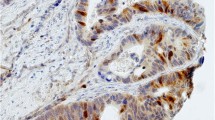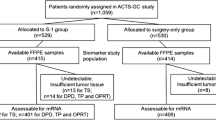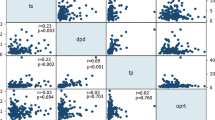Abstract
Background
5-Fluorouracil (5-FU) is the most commonly used therapeutic agent for colon cancer treatment. Several studies have evaluated in patients with colon cancer, either the role of genes involved in the 5-FU pathway, such as thymidylate synthase (TS), thymidine phosphorylase (TP) and dihydropyrimidine dehydrogenase (DPD) or the role of microsatellite instability (MSI) as prognostic or predictive markers for adjuvant chemotherapy efficacy, with discordant results. In this study we investigated the combined effect of TS, TP, DPD mRNA expression and MSI status in primary tumors of patients with colon cancer, all treated with 5-FU adjuvant therapy.
Methods
TS, TP and DPD expression levels were investigated by real-time quantitative RT-PCR on RNA extracts from formalin-fixed and paraffin-embedded tissues of 55 patients with colon adenocarcinoma. In the same case study MSI status was assessed on DNA extracts.
Results
A higher TS expression was significantly associated with a longer survival for patients with cancers of stage II (P < 0.01), but not for those with stage III (P = 0.68). In addition, in multivariate analysis, a higher TS expression was significantly associated with a decreased risk of death (HR 0.13, 95% CI 0.03–0.59, P < 0.01), while the MSI status did not have effects on patients’ survival.
Conclusions
This retrospective investigation suggests that TS gene expression at mRNA level can be a useful marker of better survival in patients (especially of those with cancers of stage II) receiving 5-FU adjuvant chemotherapy, independently of the MSI status.


Similar content being viewed by others
References
Aguiar S Jr, Lopes A, Soares FA, Rossi BM, Ferreira FO, Nakagawa WT, Carvalho AL, Filho WJ (2005) Prognostic and predictive value of the thymidylate synthase expression in patients with non-metastatic colorectal cancer. Eur J Surg Oncol 31:863–868
AJCC (1997) AJCC cancer staging manual. http://www.cancerstaging.org/products/pasteditions.html
Andersen CL, Jensen JL, Orntoft TF (2004) Normalization of real-time quantitative reverse transcription-PCR data: a model-based variance estimation approach to identify genes suited for normalization, applied to bladder and colon cancer data sets. Cancer Res 64:5245–5250
Andre T, Sargent D, Tabernero J, O’Connell M, Buyse M, Sobrero A, Misset JL, Boni C, de Gramont A (2006) Current issues in adjuvant treatment of stage II colon cancer. Ann Surg Oncol 13:887–898
Benson AB 3rd, Schrag D, Somerfield MR, Cohen AM, Figueredo AT, Flynn PJ, Krzyzanowska MK, Maroun J, McAllister P, Van Cutsem E et al (2004) American Society of Clinical Oncology recommendations on adjuvant chemotherapy for stage II colon cancer. J Clin Oncol 22:3408–3419
Buhard O, Cattaneo F, Wong YF, Yim SF, Friedman E, Flejou JF, Duval A, Hamelin R (2006) Multipopulation analysis of polymorphisms in five mononucleotide repeats used to determine the microsatellite instability status of human tumors. J Clin Oncol 24:241–251
Ciaparrone M, Quirino M, Schinzari G, Zannoni G, Corsi DC, Vecchio FM, Cassano A, La Torre G, Barone C (2006) Predictive role of thymidylate synthase, dihydropyrimidine dehydrogenase and thymidine phosphorylase expression in colorectal cancer patients receiving adjuvant 5-fluorouracil. Oncology 70:366–377
Cunningham JM, Christensen ER, Tester DJ, Kim CY, Roche PC, Burgart LJ, Thibodeau SN (1998) Hypermethylation of the hMLH1 promoter in colon cancer with microsatellite instability. Cancer Res 58:3455–3460
East JE, Saunders BP, Jass JR (2008) Sporadic and syndromic hyperplastic polyps and serrated adenomas of the colon: classification, molecular genetics, natural history, and clinical management. Gastroenterol Clin North Am 37:25–46
Edler D, Glimelius B, Hallstrom M, Jakobsen A, Johnston PG, Magnusson I, Ragnhammar P, Blomgren H (2002) Thymidylate synthase expression in colorectal cancer: a prognostic and predictive marker of benefit from adjuvant fluorouracil-based chemotherapy. J Clin Oncol 20:1721–1728
Grade M, Hormann P, Becker S, Hummon AB, Wangsa D, Varma S, Simon R, Liersch T, Becker H, Difilippantonio MJ et al (2007) Gene expression profiling reveals a massive, aneuploidy-dependent transcriptional deregulation and distinct differences between lymph node-negative and lymph node-positive colon carcinomas. Cancer Res 67:41–56
Hemminki A, Mecklin JP, Jarvinen H, Aaltonen LA, Joensuu H (2000) Microsatellite instability is a favorable prognostic indicator in patients with colorectal cancer receiving chemotherapy. Gastroenterology 119:921–928
Inoue T, Hibi K, Nakayama G, Komatsu Y, Fukuoka T, Kodera Y, Ito K, Akiyama S, Nakao A (2005) Expression level of thymidylate synthase is a good predictor of chemosensitivity to 5-fluorouracil in colorectal cancer. J Gastroenterol 40:143–147
Jemal A, Siegel R, Ward E, Hao Y, Xu J, Murray T, Thun MJ (2008) Cancer statistics, 2008. CA Cancer J Clin 58:71–96
Jensen SA, Vainer B, Sorensen JB (2007) The prognostic significance of thymidylate synthase and dihydropyrimidine dehydrogenase in colorectal cancer of 303 patients adjuvantly treated with 5-fluorouracil. Int J Cancer 120:694–701
Jensen SA, Vainer B, Kruhoffer M, Sorensen JB (2009) Microsatellite instability in colorectal cancer and association with thymidylate synthase and dihydropyrimidine dehydrogenase expression. BMC Cancer 9:25
Jorissen RN, Gibbs P, Christie M, Prakash S, Lipton L, Desai J, Kerr D, Aaltonen LA, Arango D, Kruhoffer M et al (2009) Metastasis-associated gene expression changes predict poor outcomes in patients with Dukes stage B and C colorectal cancer. Clin Cancer Res 15:7642–7651
Lassmann S, Hennig M, Rosenberg R, Nahrig J, Schreglmann J, Krause F, Poignee-Heger M, Nekarda H, Hofler H, Werner M (2006) Thymidine phosphorylase, dihydropyrimidine dehydrogenase and thymidylate synthase mRNA expression in primary colorectal tumors-correlation to tumor histopathology and clinical follow-up. Int J Colorectal Dis 21:238–247
Metzger R, Danenberg K, Leichman CG, Salonga D, Schwartz EL, Wadler S, Lenz HJ, Groshen S, Leichman L, Danenberg PV (1998) High basal level gene expression of thymidine phosphorylase (platelet-derived endothelial cell growth factor) in colorectal tumors is associated with nonresponse to 5-fluorouracil. Clin Cancer Res 4:2371–2376
Muller A, Edmonston TB, Dietmaier W, Buttner R, Fishel R, Ruschoff J (2004) MSI-testing in hereditary non-polyposis colorectal carcinoma (HNPCC). Dis Markers 20:225–236
Nardon E, Donada M, Bonin S, Dotti I, Stanta G (2009) Higher random oligo concentration improves reverse transcription yield of cDNA from bioptic tissues and quantitative RT-PCR reliability. Exp Mol Pathol 87:146–151
Pauluzzi P, Bonin S, Gonzalez Inchaurraga MA, Stanta G, Trevisan G (2004) Detection of spirochaetal DNA simultaneously in skin biopsies, peripheral blood and urine from patients with erythema migrans. Acta Derm Venereol 84:106–110
Peters GJ, Bijnsdorp IV, Fukushima M (2008) Thymidine phoshorylase as a target for antiangiogenesis treatment. Nucleic acids symposium series 2004, 629
Pfaffl MW (2001) A new mathematical model for relative quantification in real-time RT-PCR. Nucleic Acids Res 29:e45
Popat S, Matakidou A, Houlston RS (2004) Thymidylate synthase expression and prognosis in colorectal cancer: a systematic review and meta-analysis. J Clin Oncol 22:529–536
Popat S, Hubner R, Houlston RS (2005) Systematic review of microsatellite instability and colorectal cancer prognosis. J Clin Oncol 23:609–618
Popat S, Chen Z, Zhao D, Pan H, Hearle N, Chandler I, Shao Y, Aherne W, Houlston R (2006) A prospective, blinded analysis of thymidylate synthase and p53 expression as prognostic markers in the adjuvant treatment of colorectal cancer. Ann Oncol 17:1810–1817
Ribic CM, Sargent DJ, Moore MJ, Thibodeau SN, French AJ, Goldberg RM, Hamilton SR, Laurent-Puig P, Gryfe R, Shepherd LE et al (2003) Tumor microsatellite-instability status as a predictor of benefit from fluorouracil-based adjuvant chemotherapy for colon cancer. N Engl J Med 349:247–257
Ricciardiello L, Ceccarelli C, Angiolini G, Pariali M, Chieco P, Paterini P, Biasco G, Martinelli GN, Roda E, Bazzoli F (2005) High thymidylate synthase expression in colorectal cancer with microsatellite instability: implications for chemotherapeutic strategies. Clin Cancer Res 11:4234–4240
Sinicrope FA, Rego RL, Halling KC, Foster NR, Sargent DJ, La Plant B, French AJ, Allegra CJ, Laurie JA, Goldberg RM et al (2006) Thymidylate synthase expression in colon carcinomas with microsatellite instability. Clin Cancer Res 12:2738–2744
Soong R, Shah N, Salto-Tellez M, Tai BC, Soo RA, Han HC, Ng SS, Tan WL, Zeps N, Joseph D, et al. (2008) Prognostic significance of thymidylate synthase, dihydropyrimidine dehydrogenase and thymidine phosphorylase protein expression in colorectal cancer patients treated with or without 5-fluorouracil-based chemotherapy. Ann Oncol 19:915–919
Soreide K, Janssen EA, Soiland H, Korner H, Baak JP (2006) Microsatellite instability in colorectal cancer. Br J Surg 93:395–406
Stanta G, Bonin S, Perin R (1998) RNA extraction from formalin-fixed and paraffin-embedded tissues. Methods Mol Biol 86:23–26
Storojeva I, Boulay JL, Heinimann K, Ballabeni P, Terracciano L, Laffer U, Mild G, Herrmann R, Rochlitz C (2005) Prognostic and predictive relevance of microsatellite instability in colorectal cancer. Oncol Rep 14:241–249
Suraweera N, Duval A, Reperant M, Vaury C, Furlan D, Leroy K, Seruca R, Iacopetta B, Hamelin R (2002) Evaluation of tumor microsatellite instability using five quasimonomorphic mononucleotide repeats and pentaplex PCR. Gastroenterology 123:1804–1811
Takebayashi Y, Akiyama S, Akiba S, Yamada K, Miyadera K, Sumizawa T, Yamada Y, Murata F, Aikou T (1996) Clinicopathologic and prognostic significance of an angiogenic factor, thymidine phosphorylase, in human colorectal carcinoma. J Natl Cancer Inst 88:1110–1117
Tsourouflis G, Theocharis SE, Sampani A, Giagini A, Kostakis A, Kouraklis G (2008) Prognostic and predictive value of thymidylate synthase expression in colon cancer. Dig Dis Sci 53:1289–1296
Tsuji T, Sawai T, Takeshita H, Nakagoe T, Hidaka S, Atsushi N, Yamaguchi H, Yasutake T, Nagayasu T, Tagawa Y (2004) Tumor dihydropyrimidine dehydrogenase in stage II and III colorectal cancer: low level expression is a beneficial marker in oral-adjuvant chemotherapy, but is also a predictor for poor prognosis in patients treated with curative surgery alone. Cancer Lett 204:97–104
Tumori AIR, Rapporto (2006) http://www.registri-tumori.it/incidenza1998-2002/rapporto/Schede%20specifiche%20per%20tumore/Tumore%20del%20colonn.pdf
Usuki K, Saras J, Waltenberger J, Miyazono K, Pierce G, Thomason A, Heldin CH (1992) Platelet-derived endothelial cell growth factor has thymidine phosphorylase activity. Biochem Biophys Res Commun 184:1311–1316
van Kuilenburg AB, De Abreu RA, van Gennip AH (2003) Pharmacogenetic and clinical aspects of dihydropyrimidine dehydrogenase deficiency. Ann Clin Biochem 40:41–45
Vandesompele J, De Preter K, Pattyn F, Poppe B, Van Roy N, De Paepe A, Speleman F (2002) Accurate normalization of real-time quantitative RT-PCR data by geometric averaging of multiple internal control genes. Genome Biol 3, RESEARCH0034
Acknowledgments
We would like to thank IMPACTS group for technical discussion in using archive tissues (ref. group involved in the European Project No 37211). This work was supported by grants from MIUR-Prin 2006 (project number 2006063220_003) and FIRB-MIUR. The authors also thank Dr. Valentina Melita for the English revision of the manuscript.
Conflict of interest statement
There are no conflicts of interest to declare.
Author information
Authors and Affiliations
Corresponding author
Rights and permissions
About this article
Cite this article
Donada, M., Bonin, S., Nardon, E. et al. Thymidilate synthase expression predicts longer survival in patients with stage II colon cancer treated with 5-flurouracil independently of microsatellite instability. J Cancer Res Clin Oncol 137, 201–210 (2011). https://doi.org/10.1007/s00432-010-0872-1
Received:
Accepted:
Published:
Issue Date:
DOI: https://doi.org/10.1007/s00432-010-0872-1




